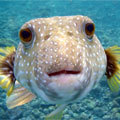Physiological Ecology
Editor(s):
Irwin Forseth |
How are organisms physiologically adapted to their environments? What happens when an organism’s environment changes? Physiological ecology is the study of these and other questions about the short and long-term behavioral and physiological adjustments organisms make in order to survive and reproduce successfully in their ever-changing environments.
The study of physiological ecology begins with an understanding of the influence of ambient temperatures. Temperature is one of the most ecologically significant factors, and also one of the most relevant in the face of global climatic change. Organisms have evolved a multitude of mechanisms for regulating the temperature of their bodies in order to flourish in their particular environment. A high metabolic rate helps supply heat. An efficient circulatory system conducts and distributes heat around the body. Hibernation enables animals to survive long periods of cold.
Water availability is another major focus in physiological ecology. The bodies of all organisms contain water, and organisms in all environments expend energy to maintain their internal pool of water and dissolved substrates. Water availability is particularly critical for desert dwelling organisms, and many ecologists studying the importance of water in biological systems focus their research on desert species.
For most organisms, life boils down to obtaining the energy and nutrients they need in order to grow and successfully reproduce, so the acquisition of energy is another key focus in physiological ecology. Ecologists classify organisms primarily by their trophic (feeding) strategies. Organisms that can access inorganic sources of both carbon and energy are called autotrophs ("self feeders"). Heterotrophs ("other feeders") are organisms that use the organic materials produced by other organisms as their sources of carbon and energy.
An increasing area of focus for physiological ecologists is the study of the effect of environmental stressors on organisms. Environmental stressors may include climate change, nutritional variability, disease, and exposure to toxins.
To develop a rich understanding of physiological ecology, begin with this introductory overview, and then explore the more than twenty other summaries you’ll find below.
The study of physiological ecology begins with an understanding of the influence of ambient temperatures. Temperature is one of the most ecologically significant factors, and also one of the most relevant in the face of global climatic change. Organisms have evolved a multitude of mechanisms for regulating the temperature of their bodies in order to flourish in their particular environment. A high metabolic rate helps supply heat. An efficient circulatory system conducts and distributes heat around the body. Hibernation enables animals to survive long periods of cold.
Water availability is another major focus in physiological ecology. The bodies of all organisms contain water, and organisms in all environments expend energy to maintain their internal pool of water and dissolved substrates. Water availability is particularly critical for desert dwelling organisms, and many ecologists studying the importance of water in biological systems focus their research on desert species.
For most organisms, life boils down to obtaining the energy and nutrients they need in order to grow and successfully reproduce, so the acquisition of energy is another key focus in physiological ecology. Ecologists classify organisms primarily by their trophic (feeding) strategies. Organisms that can access inorganic sources of both carbon and energy are called autotrophs ("self feeders"). Heterotrophs ("other feeders") are organisms that use the organic materials produced by other organisms as their sources of carbon and energy.
An increasing area of focus for physiological ecologists is the study of the effect of environmental stressors on organisms. Environmental stressors may include climate change, nutritional variability, disease, and exposure to toxins.
To develop a rich understanding of physiological ecology, begin with this introductory overview, and then explore the more than twenty other summaries you’ll find below.
Explore This Subject
Advanced














